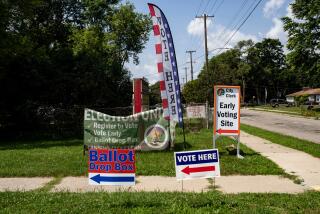Lower Republican turnout seen as warning sign to party
Two years ago, driven by anti-Obama passion, Republicans stormed the polls, punishing Democrats in a rout that delivered control of the House and swept hundreds of GOP candidates to victory across the country.
But now that Republicans are picking a candidate to face the president in November, the anti-Obama fervor appears to be cooling.
Opinion surveys show the incumbent remains highly unpopular with Republicans and the tea party wing of the GOP. But in virtually every presidential nominating contest so far, Republican turnout has fallen compared with four years ago, suggesting, at the least, a lessening of the intensity that helped fuel the party’s midterm landslide.
Analysts caution against drawing overly broad conclusions; a depressed turnout in the primary season does not automatically translate to reduced interest in the fall campaign. And with the nominating contest suddenly more competitive after Rick Santorum’s three-state sweep on Tuesday, interest could pick up and drive more people to vote, starting with the primaries Feb. 28 in Arizona and Michigan.
But if the pattern continued, it would mean Republicans couldn’t simply sit back and count on supporters to swarm the polls in November out of eagerness to drive President Obama from office.
“It’s a warning sign,” said Michael McDonald, a George Mason University political science professor and expert on voter turnout.
While the Republican race has been marked by any number of twists, the decline in turnout has been consistent from the first contests in Iowa and New Hampshire, with the number of self-identified Republican voters falling everywhere but South Carolina. The burst of enthusiasm there followed two closely watched debates and 11 days of fierce campaigning. But it failed to carry forward.
Turnout has fallen in every contest since: down 14% in Florida, 26% in Nevada, 6% in Colorado, 23% in Minnesota and 58% in Missouri — a fact the Obama camp was eager to highlight. “Republicans’ consistently low turnout shows that they are voting with their feet and staying home,” Joel Benenson, an Obama pollster, asserted in a memo to reporters.
Part of the reason may be the unremittingly harsh tone of the GOP nominating contest, since the very intent of negative ads is to depress turnout. (South Carolina has some of the most pugilistic politics in the country — think of Republican Rep. Joe Wilson bellowing “You lie!” during Obama’s 2009 State of the Union speech — so perhaps voters there were less put off by the nastiness.)
But another reason may by a distinct lack of excitement surrounding the front-runner, Mitt Romney, who has struggled to consolidate support behind his candidacy even after convincing wins in New Hampshire, Florida and Nevada. His performance Tuesday, losing Colorado, Minnesota and Missouri to Santorum, a former senator from Pennsylvania, kept Romney from wrapping up the nomination as quickly as strategists hoped and means the nominating fight will go on for weeks, if not months.
There is a notable exception to the downward trend, which offers little solace to the former Massachusetts governor: While overall Republican turnout has fallen, in at least two states, Colorado and Florida, it rose in areas where Santorum and former House Speaker Newt Gingrich fared best.
That suggests that while conservatives are eager to vote for candidates they believe share their values and convictions, there is less enthusiasm for Romney, whom many —especially social conservatives — consider less attuned to their views.
Neil Newhouse, a Romney pollster, professed not to worry. “Participation in presidential primaries is driven by close contests with multiple candidates vying for the vote,” he said in an email, citing Florida as an example. “Two of the four candidates weren’t even in the state when the polls closed.”
McDonald, the professor who sees warning signs for whomever Republicans nominate, agreed there was no need for Republicans to panic — at least not yet.
“There’s ample opportunity to correct course,” he said. “That’s what this extended primary season is all about: making the candidates into better candidates and making their campaigns function more efficiently.”
More to Read
Get the L.A. Times Politics newsletter
Deeply reported insights into legislation, politics and policy from Sacramento, Washington and beyond. In your inbox three times per week.
You may occasionally receive promotional content from the Los Angeles Times.











